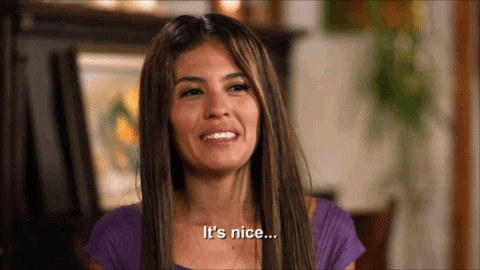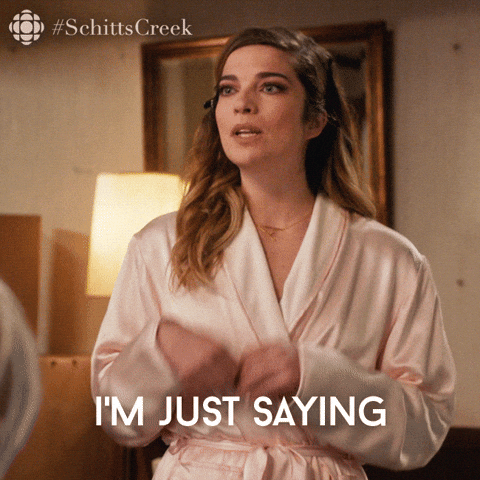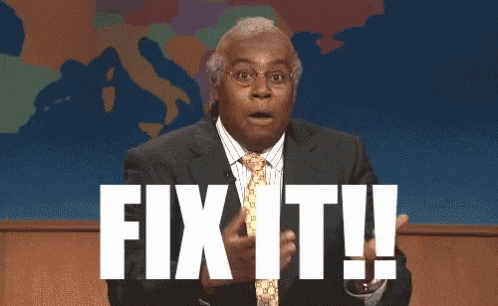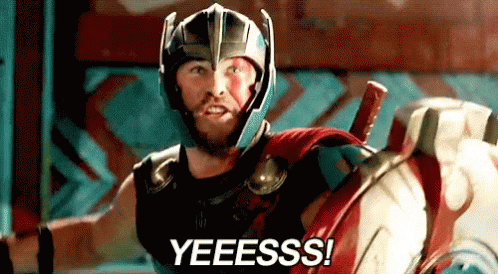Revisiting Fantasy Feminism
A refreshed repost of a revisit to my old ideas about feminism in fantasy...
Well, friends, here we are--officially halfway done with 2025.
I am back at work on Soultainted, and though I don't have any specific updates yet, I have been thinking anew about the women in my book. As I'm sure most of you know, I have pretty strong feelings about my female characters having agency, and this has been a consistent theme for pretty much the whole course of working on this dang series.
I remembered a post from a couple of years ago about how I revisited my early opinions about fantasy feminism, and I thought I'd go back to update that post and reshare it. So with a few revisions for length and some new GIFs (because I like them), I re-submit to you all my disturbingly consistent thoughts about feminism in fantasy.
How It Started
Back in 2012, I wrote writing advice articles for Fantasy-Faction, and I ended up pontificating about feminism over the course of four weeks (part 1, part 2, part 3, and part 4). I guess I had a lot to say.
In re-reading my previous thoughts. I discovered two things:
I broke a lot of my own advice: I think my female characters have a fairly diverse set of skills, interests, and abilities, but I made them all far too pretty. I muddled up Mairead’s face with some tattoos, and Minerva/Esma is described as “plain,” but that’s about it.
I still agree with most of what I wrote: Look, I’ve been through a lot since those posts. A LOT. Some of the things I’ve experienced in the last 13 years affected my writing life. Some of those things I had to process from a distinctly female perspective. Despite the life events, my perspective has remained fairly consistent.
Recent Thoughts on Writing Women in Fantasy
So having reviewed my past thoughts and having worked with these female characters now for many years, here are a few of my more recent thoughts on writing women in fantasy…
Women have to deal with the same shtuff through the ages: The further I get into this whole series, the more I realize that everything Igraine, Mairead, Maeve, and Minerva have to deal with is the same damn shhhhhhhtuff women have always had to deal with. Condescension, mansplaining, people protecting us “for our own good,” trying to establish authority in a world where men have always led, being the smartest person in the room when no one wants to acknowledge it, balancing family with a demanding job or calling… The more things change, the more they stay the same.
One could argue that of course they have to deal with all the same stuff, because their creator is a 55-year-old woman living in the Western world in 2025 and has a distinct perspective on these things. Fair point. But as I've delved into Medieval history over the past couple of years, it has become ever more apparent that many of the strongest women in history (Eleanor of Aquitaine, Isabella of France, Elizabeth I) became world changers in large part because they managed to work through and around and over the challenges presented by living in a world dominated by men. Call it a kind of political and social parkour, perhaps.
This is where women can write what they know: I don’t know what it’s like to live in a Medieval world. I can’t swing a sword or shoot a bow. I can sort of stay on the back of a horse, at least to get from point A to point B, but if I tried to do anything more than that, I’d probably fall off. But I do understand what it’s like to feel trapped, to try to balance all the demands on my life, and to have a man talk down to me. What I really have to do is translate those reactions into that Medieval world.
Even for a woman, women are hard to write: In some sense, I have a harder time writing female characters than I do writing male characters. Perhaps this is because it’s hard to not project my own individual reactions, motivations, needs, and worldview onto characters with whom I share biology.
The Women of Taura
So here I am–trying to untangle the three main female characters and figure out what I’m really dealing with and what they’re really dealing with, and it’s tricky.
Unquickened was largely Igraine’s story. She's been the most vocal feminist in this series so far, so it’s not surprising that her book would cover a lot of these issues. She spends much of this part of the series “trapped,” in some sense–trapped and waiting. Every woman I know has, at some point, felt this way–trapped in her own life, stuck until something happens to unjam everything, frustrated with a lack of progress or control. It doesn’t matter what the specifics are–these are familiar feelings, and that’s where the character comes from. Even when we love our families and live comfortably, we can still wish something would just freakin' change.
Mairead’s story in Unquickened is similar, but as the warrior and a leader, Mairead had to learn how to bring her unique perspective and skill to a world dominated by men. War is ugly and brutal, and Mairead has an ability to handle it that a lot of women don’t share. But mystical signs and prophecies aren’t enough to settle doubts about her, and when coupled with her clear physical disadvantage in fighting against men, she constantly felt the need to prove herself.
Every woman I’ve ever met has felt this way at some point–that no matter her education, qualifications, or other clear evidence of her abilities, somewhere, someone will doubt her more than that person would doubt a man in the same position. Even if every man everywhere in every position gave every woman the same benefit of the doubt as he would another man, there’s still a sense that we have to prove something. It’s exhausting.
I am not blaming anyone in particular for this phenomenon, nor am I saying that "something should be done." I'm also not suggesting that men never feel these things; I'm sure they do since they're--you know--human. I'm just offering up a description and detail about what it's like to be a woman.
In some sense, Minerva/Esma is the easiest to write, and I think it may be largely because I relate to her the most. Quiet and reclusive by nature, Minerva does know a lot about medicine and healing, and when her skills are needed, she doesn’t wait for permission–she just acts. It helps that in the world of Taura, I’ve given most of the healing responsibility to women.
Where Minerva/Esma has trouble is in trusting herself. When it comes to healing, she trusts her knowledge, but in other areas, she can’t believe that she is capable of making the right decisions or choices for her life. Minerva is largely a reactionary character who assumes that she needs to wait for direction or guidance from others. Again, every woman I know has struggled with this at some point. It is so hard to trust your own choices when there is constant pushback from outside.
The Taurin Feminist
So where does all of this leave these Taurin women?
I think it's tempting to believe that the world could just wave a wand to declare a perfect balance between women and men--one law, policy, edict, something that would just FIX IT all, once and for all.
The thing is... Feminism isn’t a “one and done” kind of thing, in part because we all have slightly different understandings of it (I’m mostly of the “women are human beings endowed with the same inalienable rights as men” variety). It’s not a worldview that is ever fully settled, and I don’t think really can be, given that other issues of relatively less importance are still being relitigated in the public square.
So perhaps it’s better to look to the strong, more settled female characters for wisdom. In the world of The Taurin Chronicles….
Alfrig, may she rest in peace, was a woman who knew her own mind and didn’t ask permission, yet managed to craft a fulfilling life with Hrogarth.
Maeve, for all her overbearing mothering instincts, seems to adhere to the “bitches get stuff done” model. It may cause problems, but… it does get stuff done.
Letha is the ideal bestie--the woman who has her friend's back, even as she's still figuring it all out herself.
Rhiannon may be my favorite of the women in Taura, and not just because she’s based on my best friend. Rhiannon is unapologetic about everything. She is fierce and competent, kind and protective, loyal and wise.
Tirzah, a woman with a religious worldview who nonetheless believes every woman has the right to decide her future and fate for herself.
And there are the men, too. The tribal men get it. They are the most egalitarian of any men in this world, largely because the tribal women leave them no option. And in some sense, women who are struggling to make it in a man’s world need that kind of backup–those kinds of allies. If you’re at a disadvantage, you can level the playing field if the most powerful guy on the block backs you up.
As I revisit these ideas and update them a bit, I think I'm mostly consistent--which, honestly, is kind of satisfying. I think it means that my biggest goal has always been to give my female characters agency.
But as I add a few supporting women to the series, and as I let these main female characters evolve, I do think they're all getting a little stronger overall. Even Minerva is getting more outspoken in Soultainted, and knowing how everything finally ends, I think it's fair to say that all of my female characters craft the life they want.
Whether their lives stay that way after the final pages?
That's for another post.
Or maybe for The Taurin Chronicles: The Next Generation.













Thank you for the re-visit.
Part of my struggles with "Asylum" (half finished sequel to "Dremiks" that has taken me 13 years to write) is that I am trying so very hard to write the protagonist, "Lilly" as someone very different from my other female characters.
It. Is. Hard.
Interesting. I was looking at BlueSky (hoping I could find you there since I do NO other sm) and at least a couple of your articles from Fantasy Faction were mentioned there.
But I didn't find you, which you may be happy about since I have a complaint: that I can't reply to your comments here without a substack account, which for various and sundry reasons, I choose not to have. Not that you could do anything about it either, but I didn't want you to think you were always shouting into the void!
Anyway, I sought The Will of the Many at the library as you suggested, and all the copies they have available were either checked out (8 of ten) or on hold (2 of ten). People agree with you, it appears.
Thanks and best wishes!